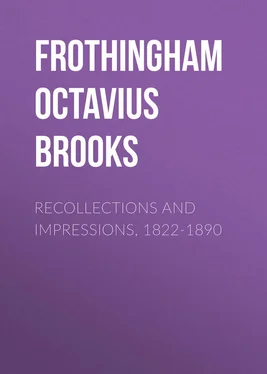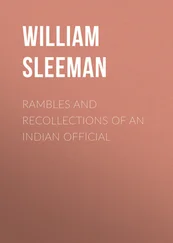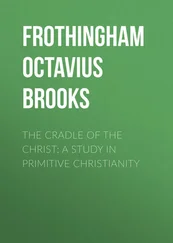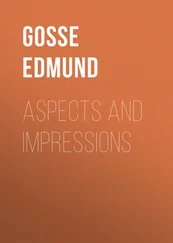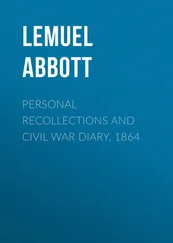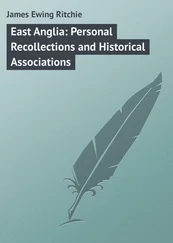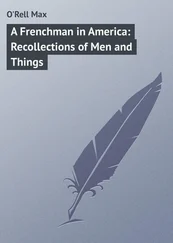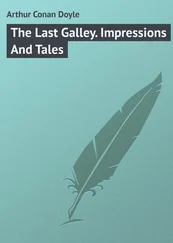Octavius Frothingham - Recollections and Impressions, 1822-1890
Здесь есть возможность читать онлайн «Octavius Frothingham - Recollections and Impressions, 1822-1890» — ознакомительный отрывок электронной книги совершенно бесплатно, а после прочтения отрывка купить полную версию. В некоторых случаях можно слушать аудио, скачать через торрент в формате fb2 и присутствует краткое содержание. Жанр: foreign_antique, foreign_prose, на английском языке. Описание произведения, (предисловие) а так же отзывы посетителей доступны на портале библиотеки ЛибКат.
- Название:Recollections and Impressions, 1822-1890
- Автор:
- Жанр:
- Год:неизвестен
- ISBN:нет данных
- Рейтинг книги:3 / 5. Голосов: 1
-
Избранное:Добавить в избранное
- Отзывы:
-
Ваша оценка:
- 60
- 1
- 2
- 3
- 4
- 5
Recollections and Impressions, 1822-1890: краткое содержание, описание и аннотация
Предлагаем к чтению аннотацию, описание, краткое содержание или предисловие (зависит от того, что написал сам автор книги «Recollections and Impressions, 1822-1890»). Если вы не нашли необходимую информацию о книге — напишите в комментариях, мы постараемся отыскать её.
Recollections and Impressions, 1822-1890 — читать онлайн ознакомительный отрывок
Ниже представлен текст книги, разбитый по страницам. Система сохранения места последней прочитанной страницы, позволяет с удобством читать онлайн бесплатно книгу «Recollections and Impressions, 1822-1890», без необходимости каждый раз заново искать на чём Вы остановились. Поставьте закладку, и сможете в любой момент перейти на страницу, на которой закончили чтение.
Интервал:
Закладка:
Among the distinguished men were William H. Prescott, Benjamin Peirce, Nathaniel Hawthorne, John Lewis Russell, Charles Grafton Page, and Jones Very. Here lived Edward Augustus Holyoke, president of the Massachusetts Medical Society and the American Academy of Arts and Sciences; Timothy Pickering, Rev. John Prince, Rev. William Bentley, Nathaniel Bowditch, author of the "Practical Navigator" and translator of the "Mecanique Celeste"; John Pickering, Joseph Story, of the Supreme Bench; Daniel Appleton White, Leverett Saltonstall, Benjamin Merrill, and many another man of accomplishments and learning. Even the uneducated, and those engaged in the common occupations of everyday life, gratified their love of knowledge, and followed up, for their private enjoyment, researches in intellectual and philosophical spheres; apothecaries and retail shopkeepers distinguished themselves as writers; one of them – Isaac Newhall by name – was reputed the author of the famous "Junius Letters," thus enjoying companionship with Burke, Gibbon, Grattan, Camden, Chatham, Chesterfield, and other distinguished writers.
Its commercial history was exceedingly brilliant. In its palmy days it had more trade with the East Indies than all the other American ports put together. Its situation by the sea encouraged maritime adventure. From its very infancy its inhabitants sent vessels across the Atlantic of forty to sixty tons, and followed up the trade with Spain, France, Italy, and the West India Islands. In the war of the Revolution it sent out one hundred and fifty-eight armed ships, mounting at least two thousand guns, and carrying not less than six thousand men. In 1785, Salem sent out the first vessel to the Isle of France, Calcutta, and China; she began also the trade to the other ports of the East Indies and Japan; to Madagascar and Zanzibar, Brazil and Africa. In the south seas, Salem ships first visited the Fiji Islands; they first opened up to our commerce New Holland and New Zealand. In the war of 1812 she had two hundred and fifty privateers. When the war was over, these vessels were engaged in the merchant service. Mr. E. H. Derby, one of the great merchants, said to be the richest man in America, sent out thirty-seven vessels in fourteen years, making a hundred and twenty voyages. The names of the great merchants, E. H. Derby, N. Silsbee, William Gray, Peabody, Crowningshield, Pickman, Cleveland, Cabot, Higginson, are of universal celebrity. Then Derby Street was alive with sea-captains, the custom-house was active, the tall warehouses were full of treasures, the great East Indiamen fairly made the air fragrant as they unloaded their merchandise. To quote the language of "Eleanor Putnam": "There was poetry in the names of the vessels – the ship Lotus , the Black Warrior , the brig Persia , the Light Horse , the Three Friends , and the great Grand Turk . There was, too, a charm about the cargoes. They were no common-place bales of merchandise, but were suggestive in their very names of the sweet, strange odors of the East, from which they came. There was food for the imagination in the mention of those ship-loads of gum copal from Madagascar and Zanzibar; of hemp and iron from Russia; of Bombay cotton; of ginger, pepper, coffee, and sugar from India; of teas, silks, and nankeens from China; salt from Cadiz; and fruits from the ports of the Mediterranean."
Miss Putnam speaks of the gorgeous fans, the carved ivory, the blue Canton china, the generous tea-cups, the tureens, the heavy tankards, the Delft jars, the ancient candle-sticks, the heavy punch bowls, the strange beads, suggestive of the Hindoo rites, Nautch dances, and women with dusky throats. Then the very air was weighty with romantic adventures. We read with awe of cashmere shawls hanging on clothes lines, of jars full of silver coin, of the gilded fishes on the side of each stair, of the grand staircase in the front hall of Mr. Pickman's house on Essex Street, of logs of sandal-wood. The museum of the East India Marine Society contains sceptres from the Fiji Islands; a musical instrument from New South Wales, another from Borneo; a carved statue of a rich Persian merchant of Bombay; an alabaster figure of a Chinese Jos; a copper idol from Java; a mirror from Japan; fans from Maraba, the Marquesas Islands, Calcutta; cloth from Otaheite; an earthen patera from Herculaneum; two dresses of women from the Pelew Islands; sandal-wood from the Sandwich Islands; a parasol from Calcutta; nutmegs from Cayenne; thirty-six specimens of Italian marble; cement from the palace of the Cæsars at Rome; white marble from Carthage; porphyry from Italy; beads worn by the Pundits and Fakirs in India; a glass cup from Owyhee; Verde Antico from Sicily; sandal-wood tapers from China; wood images of mummies from Thebes; a silver box from Soo-Soo; porphyry from Madagascar; a piece of mosaic from ancient Carthage; silk cocoons from India; marble from the temple of Minerva at Athens; piece of pavement from the site of ancient Troy; and polished jasper from Siberia.
When I was in Salem, from 1847 to 1855, this splendor had departed. Derby Street was deserted, the great warehouses were tenements for laborers. Hawthorne has described the custom-house in his famous preface to the "Scarlet Letter." The sailors had disappeared; the commerce, owing mainly to the shallowness of the water in the harbor, had gone to Boston and New York. But traces of the old glory still lingered. Here and there a great merchant was seen on the streets. Some of the old houses remained: the Pickering House on Broad Street, built in 1651; the Turner House; Roger Williams' house, at the corner of Essex and North Streets, built before 1634; and Mr. Forrester's house.
As the chairman of the Salem Lyceum, it was my privilege to entertain such men as R. W. Emerson, George W. Curtis and others. Thomas Starr King, when he lectured in Danvers, drove over to my house, and spent the rest of the evening. Nathaniel Hawthorne I used to meet frequently on the street. I often saw Mrs. Hawthorne leading her children by the hand. Mr. Hawthorne, who was in Salem from 1846 to 1849, was remarkable for his shyness. His favorite companions were some Democratic politicians, who met weekly at the office of one of them, where he occupied himself in listening to their talk, but he avoided cultivated people. On one occasion a friend of mine asked us to meet him at dinner; twice he went to remind his guest of the engagement. The hour arrived, the dinner was kept waiting half an hour for Mr. Hawthorne to come. He said but little during the dinner, and immediately afterward got up and went away; his reluctance to meet people overcoming his sense of propriety.
My church, the "North Church," as it was called, was a handsome building on the main street, a stone structure with a tower, and a green before it. It was founded in 1772 by people who had left the First Parish by reason of great dissatisfaction. The first minister, called in 1773, was Thomas Barnard. He was a broad-minded, liberal man, and left the church substantially Unitarian. His successor was J. E. Abbot, called in 1815, whose ministry, from ill-health, was very short. My predecessor, John Brazer, a cultivated, scholarly, sensitive man, a good preacher, an excellent pastor, was settled in 1820. My ministry there was exceedingly pleasant and tranquil for several years. There were long hours for studying; the parish work was not hard; the people were honest, quiet, sober, some of them exceedingly refined and gentle; it was as if the old Puritan spirit, modified by time, still lingered about the old town. Family life was beautiful to see; the homes were charming; there was luxury enough; there was great intelligence, singular activity of mind; and I remember well the bright conversations, the entertainments, the teas, the dinners, the receptions, the social meetings. The women, especially, were distinguished for interest in literary matters. Many interesting people still lived in the town, Daniel Appleton White, for instance, Dr. Treadwell, Benjamin Merrill, Thomas Cole; some of these were my parishioners and all were my friends. But the life was almost too quiet for me, as circumstances presently proved.
Читать дальшеИнтервал:
Закладка:
Похожие книги на «Recollections and Impressions, 1822-1890»
Представляем Вашему вниманию похожие книги на «Recollections and Impressions, 1822-1890» списком для выбора. Мы отобрали схожую по названию и смыслу литературу в надежде предоставить читателям больше вариантов отыскать новые, интересные, ещё непрочитанные произведения.
Обсуждение, отзывы о книге «Recollections and Impressions, 1822-1890» и просто собственные мнения читателей. Оставьте ваши комментарии, напишите, что Вы думаете о произведении, его смысле или главных героях. Укажите что конкретно понравилось, а что нет, и почему Вы так считаете.
